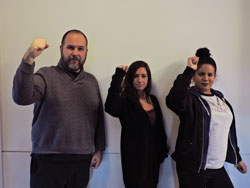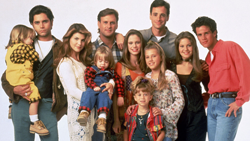I am a feminist. Queue the questions and judgements. Yes, you heard correctly, I am a feminist, I am not a female, and feminism isn’t a women’s issue.
Merriam-Webster defines feminism as “the theory of the political, economic, and social equality of the sexes.”
Sadly, we’ve grown up in a society that color-coded infants according to gender; boys in blue, girls in pink. This socialization is something that causes a rift between the two genders rather than considering them both as equal.
This goes beyond color-coding; the toys children receive are also based on the parents and society’s views on what’s culturally appropriate per gender role.
Parents often gift male children with toy trucks, superheroes, and anything that would promote aggression and an authoritative mindset, while female children predominately receive dolls, doll houses, and dress- up kits which endorse nurturing and communal contiguity meaning they get a better understanding of “family.”
I splurge these facts solely to explain that the negative male complex is related to the years of men being raised as the superior gender. And then there’s the dilemma of how society views a female that does not suit the traditional norms their families have set forth or what society is accustomed to. I would be doing an injustice if I were to attempt to define what femininity is because that definition differs from female to female.
Regardless of the female’s family norms and how society defines what being female is, the mind is the female’s and she can determine what being a female means to her. Regardless of how they define their gender, they should always be receiving respect and equality and not yearning for it.
Sean Becker, a freshman accounting student, shared his views, “In my opinion, I disagree with the entire concept of the phrase feminism. If you are going to argue and rally for equality, do not put one of the options over the other. If you want males and females to be equal, market your group as an ‘equalist,’ or something of the sort. Do not single out females. That implies that you want females to be more important which is not equality.”
My view may be different than Becker’s, but I appreciate and understand that his problem is with the phrase “feminism” rather than the thought of equality. People tend to have a distasteful view on feminism strictly because of the terminology of it.
Dr. Lynn Siracusa, a lecturer of English, further analyzes the term “feminism”: “Feminism is a social justice movement centered on matters that impact women, but it has also been viewed as an intersectional movement focused on marginalized and oppressed people. Men can (and should) play a role in tearing down social, political, and economic systems that sustain patterns of male privilege.”
Siracusa continued, “With the recent Women’s Marches, I was happy to see fathers, brothers, sons, and spouses come out to support women in their pursuit of essential American values.”
Conservative views may continue to exist, but there’s still hope. The new uprisings of feminism are encouraging men to get behind the outspoken women and spread the belief that feminism is just a group of people who want equality for all. The same benefits, the same respects, and the same freedom to dream and inspire younger generations.
Nick Vail-Stein, a freshman software engineering student, said, “I believe that feminism is typically misunderstood. Feminism is a lot less radical in nature as it is equal in nature. Feminism, for me, is women’s way of asking for equality.”
Vail-Stein elaborated, “On paper that sounds very simple, but sadly in reality it can be misinterpreted. As for gender roles, I don’t belittle anyone that chooses to follow them, but I believe people have the freedom to go against gender roles without being out casted.”
Equality is achievable if society works together. This goal can be achieved if we start to not color-code gender, teach boys that they aren’t superior to girls, buckle down on corporations that unfairly pay or mistreat women, and to create a society that sees females and males as what they truly are—humans.
In the 19th and 20th centuries there have been two waves of feminism. The first wave was to make women equal to men in the eyes of law by granting women the right to vote. The second wave, however, went further; women fought social issues such as abortion, equal pay, assault crimes, and more. Progression is in the making and women have a voice now more than ever. Society, not just men, must understand that feminism is just another way of stating that women want equality, not special treatment.
To truly achieve or erase this ideology of superiority that men feel is to attack it at its root. We must, as a society, break this norm, we can start with small things like giving children gender-neutral toys so they can become more well rounded and less biased. But, looking at the bigger picture, these norms and family traditions are imbedded by what the society sees as right or wrong.
We must collectively show society the traumatic problems of gender roles and being gender specific and how poorly it affects the psychology of growing men and women, in a world where we should only be going forward, not backwards. Going forward, we need all hands on deck, which means that all genders need to get involved in the fight for equality, for what’s right.
PHOTO TAKEN by Alexandria Afanador



